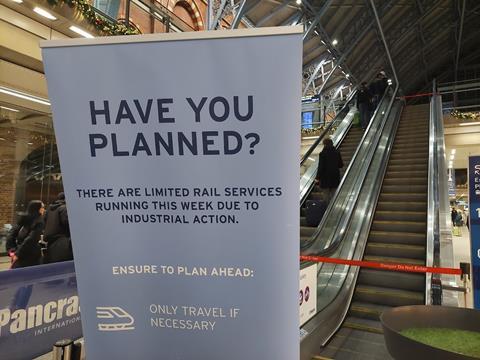
UK: The House of Commons Transport Committee has published a report outlining what it says the government should include in future regulations requiring railway companies to provide minimum service levels during strikes.
The Strikes (Minimum Service Levels) Act became law earlier this year, but details of how the regulations implementing it will work have yet to be announced.
The government has set out two main options. One would see all timetables set at a reduced level, while the other would see a set of routes prioritised; in its impact assessment, Department for Transport said that the second was its preferred option.
Transport Committee Chair Iain Stewart said ‘the government needs to make the first move. Only then will stakeholders be able to feed back on the practicalities, so that regulations can be fine-tuned and plans drawn up.’
Nine criteria
In the report published on September 22 the Committee says future regulations should meet a number of criteria:
a) the minimum service level provided on strike days should be at least as good as typically provided on previous strike days;
b) safety for staff and the public must be the primary consideration;
c) the minimum service level must be flexible enough to be applied to different patterns of industrial action affecting different employers;
d) regulations should reflect the differential impacts on staff operating services on strike days. The greater responsibilities placed on those who must work on strike days to provide a minimum service must be reflected in pay and conditions. Resilience in staffing must be improved so that there are trained alternatives able to cover for specialised staff who may want to exercise their right to strike;
e) the minimum service level must be specified in a way which enables knowledge about travel patterns in particular areas, including access to employment, education and essential services, to be taken into account;
f) rail services — or credible alternatives — should be available in all areas normally served;
g) passengers with access needs must receive the same support as they are entitled to on regular travel days;
h) a minimum service level for rail should protect industries, such as the night-time economy, that cannot adopt flexible and remote working patterns on strike days;
i) there must be clarity about the access that freight services can expect to have to the network.
The Committee also recommends criteria that DfT should use to assess the success or otherwise of the regulations:
a) industrial disputes have neither been prolonged nor increased, and ‘novel industrial action’ has not proliferated;
b) passenger satisfaction on strike days is greater than at present, with clearly communicated information and greater certainty, further in advance than at present, about travel on strike days;
c) long term, there is more effective co-operation and better working relationships between unions, the industry and government.
The report also includes evidence on how minimum service levels are operated in other countries, the impacts that strikes and new regulations could have on the rail freight.
Responses
A DfT spokesperson told Rail Business UK ’it is only right that we balance the ability to strike with minimising the impacts on passengers, and we will carefully consider the Committee’s report to ensure we achieve this balance’.
RMT union General Secretary Mick Lynch said the legislation was ‘profoundly flawed’, and ‘instead of attacking workers right to strike the government should spend its energy on resolving the national rail disputes’.
TSSA Joint (Interim) General Secretary Peter Pendle said the proposals were ‘a belated attempt to make this unfair and undemocratic legislation look palatable.’
Mick Whelan, General Secretary of drivers’ union ASLEF, said the legislation was ‘morally wrong, and anti-democratic’, but welcomed ’interest from the Transport Committee on what is currently unsafe and unworkable’. He said the nine tests ’are not achieved now so cannot, and will not, be achieved under minimum service levels; and any belief that it will improve industrial relations in any way is utterly naïve’.



